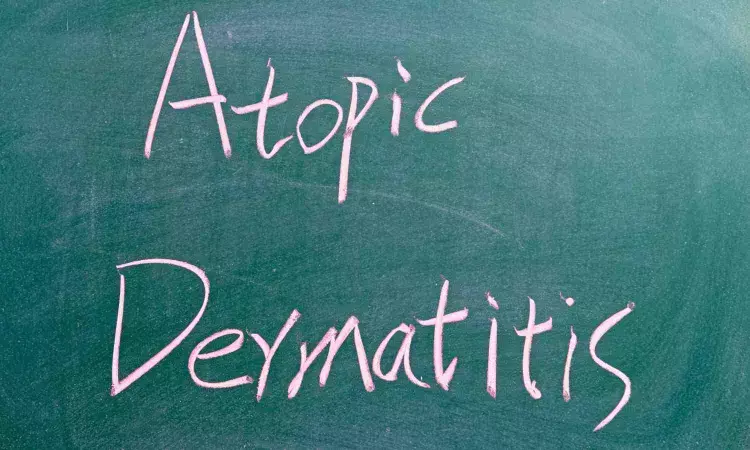- Home
- Medical news & Guidelines
- Anesthesiology
- Cardiology and CTVS
- Critical Care
- Dentistry
- Dermatology
- Diabetes and Endocrinology
- ENT
- Gastroenterology
- Medicine
- Nephrology
- Neurology
- Obstretics-Gynaecology
- Oncology
- Ophthalmology
- Orthopaedics
- Pediatrics-Neonatology
- Psychiatry
- Pulmonology
- Radiology
- Surgery
- Urology
- Laboratory Medicine
- Diet
- Nursing
- Paramedical
- Physiotherapy
- Health news
- Fact Check
- Bone Health Fact Check
- Brain Health Fact Check
- Cancer Related Fact Check
- Child Care Fact Check
- Dental and oral health fact check
- Diabetes and metabolic health fact check
- Diet and Nutrition Fact Check
- Eye and ENT Care Fact Check
- Fitness fact check
- Gut health fact check
- Heart health fact check
- Kidney health fact check
- Medical education fact check
- Men's health fact check
- Respiratory fact check
- Skin and hair care fact check
- Vaccine and Immunization fact check
- Women's health fact check
- AYUSH
- State News
- Andaman and Nicobar Islands
- Andhra Pradesh
- Arunachal Pradesh
- Assam
- Bihar
- Chandigarh
- Chattisgarh
- Dadra and Nagar Haveli
- Daman and Diu
- Delhi
- Goa
- Gujarat
- Haryana
- Himachal Pradesh
- Jammu & Kashmir
- Jharkhand
- Karnataka
- Kerala
- Ladakh
- Lakshadweep
- Madhya Pradesh
- Maharashtra
- Manipur
- Meghalaya
- Mizoram
- Nagaland
- Odisha
- Puducherry
- Punjab
- Rajasthan
- Sikkim
- Tamil Nadu
- Telangana
- Tripura
- Uttar Pradesh
- Uttrakhand
- West Bengal
- Medical Education
- Industry
Tralokinumab Promising for Moderate-to-Severe Atopic Dermatitis: 28-Week Real-World Study Results

Netherlands: A recent study demonstrated that tralokinumab is an effective treatment for moderate-to-severe atopic dermatitis in adult patients, regardless of whether they are dupilumab-naïve or dupilumab non-naïve. The findings were published online in Allergy, the official journal of the European Academy of Allergy and Clinical Immunology (EAACI), on December 14, 2024.
"This prospective multicenter study offers valuable insights into the effectiveness and safety of the first 28 weeks of tralokinumab treatment in adult atopic dermatitis patients," stated the investigators, led by Coco Dekkers, PhD candidate, from University Medical Center Utrecht in the Netherlands.
Tralokinumab, a biologic that specifically targets interleukin-13, is among the newer advanced systemic treatments for moderate-to-severe atopic dermatitis (AD). While phase-III clinical trials have demonstrated its safety and efficacy, real-world data on its use in daily practice are still needed. To address this gap, Coco Dekkers, National Expertise Center for Atopic Dermatitis, Department of Dermatology and Allergology, University Medical Center Utrecht, Utrecht, The Netherlands, and colleagues sought to evaluate the safety, effectiveness, serum proteins, and total IgE levels in adult AD patients treated with tralokinumab over 28 weeks in a real-world setting.
For this purpose, the researchers collected data from all adult AD patients who initiated treatment with tralokinumab and participated in the BioDay registry. Data were gathered at baseline and after 4, 16, and 28 weeks of treatment. Clinical efficacy was assessed using clinical outcome measures, such as the Eczema Area and Severity Index (EASI), and patient-reported outcome measures, such as the numerical rating scale (NRS) for pruritus. Adverse events were monitored, and in a subgroup of patients, 18 proteins and total IgE levels were measured in serum.
The study revealed the following findings:
- A total of 84 patients participated in the study, including 39 dupilumab-naïve (D-naïve) and 45 dupilumab non-naïve (D-non-naïve) patients.
- All primary outcomes showed significant improvement over 28 weeks of tralokinumab treatment.
- The probability of achieving EASI ≤ 7 was 75.8%, and the probability of achieving NRS pruritus ≤ 4 was 51.4%.
- Disease severity-associated proteins, TARC/CCL17 and PARC/CCL18, decreased during treatment.
- Total IgE levels significantly decreased in D-naïve patients.
- The most reported adverse events were eye disorders, affecting 28.6% of patients.
- A total of 23 patients (27.4%) discontinued treatment due to adverse events and/or ineffectiveness, with hair loss being the most common reason for discontinuation (6 patients).
The researchers concluded that tralokinumab is an effective and safe treatment option for moderate-to-severe atopic dermatitis in a real-world clinical setting, benefiting both dupilumab-naïve and dupilumab non-naïve patients.
"Despite targeting the same immunologic pathway as dupilumab, their findings suggest that tralokinumab remains a valuable alternative following dupilumab discontinuation. These results help position tralokinumab within the evolving landscape of atopic dermatitis treatments," they wrote.
Reference:
Dekkers, C., Zuithoff, N., Bakker, D., Knol, E., Wevers, A., Touwslager, W., Christoffers, W., Prosje, P., Kamsteeg, M., Oosting, A. J., A. Schuttelaar, M. L., & Haeck, I. Tralokinumab Treatment in Adult Atopic Dermatitis Patients: 28-Week Evaluation of Clinical Effectiveness, Safety, Serum Proteins and Total IgE Levels. Allergy. https://doi.org/10.1111/all.16414
Dr Kamal Kant Kohli-MBBS, DTCD- a chest specialist with more than 30 years of practice and a flair for writing clinical articles, Dr Kamal Kant Kohli joined Medical Dialogues as a Chief Editor of Medical News. Besides writing articles, as an editor, he proofreads and verifies all the medical content published on Medical Dialogues including those coming from journals, studies,medical conferences,guidelines etc. Email: drkohli@medicaldialogues.in. Contact no. 011-43720751


